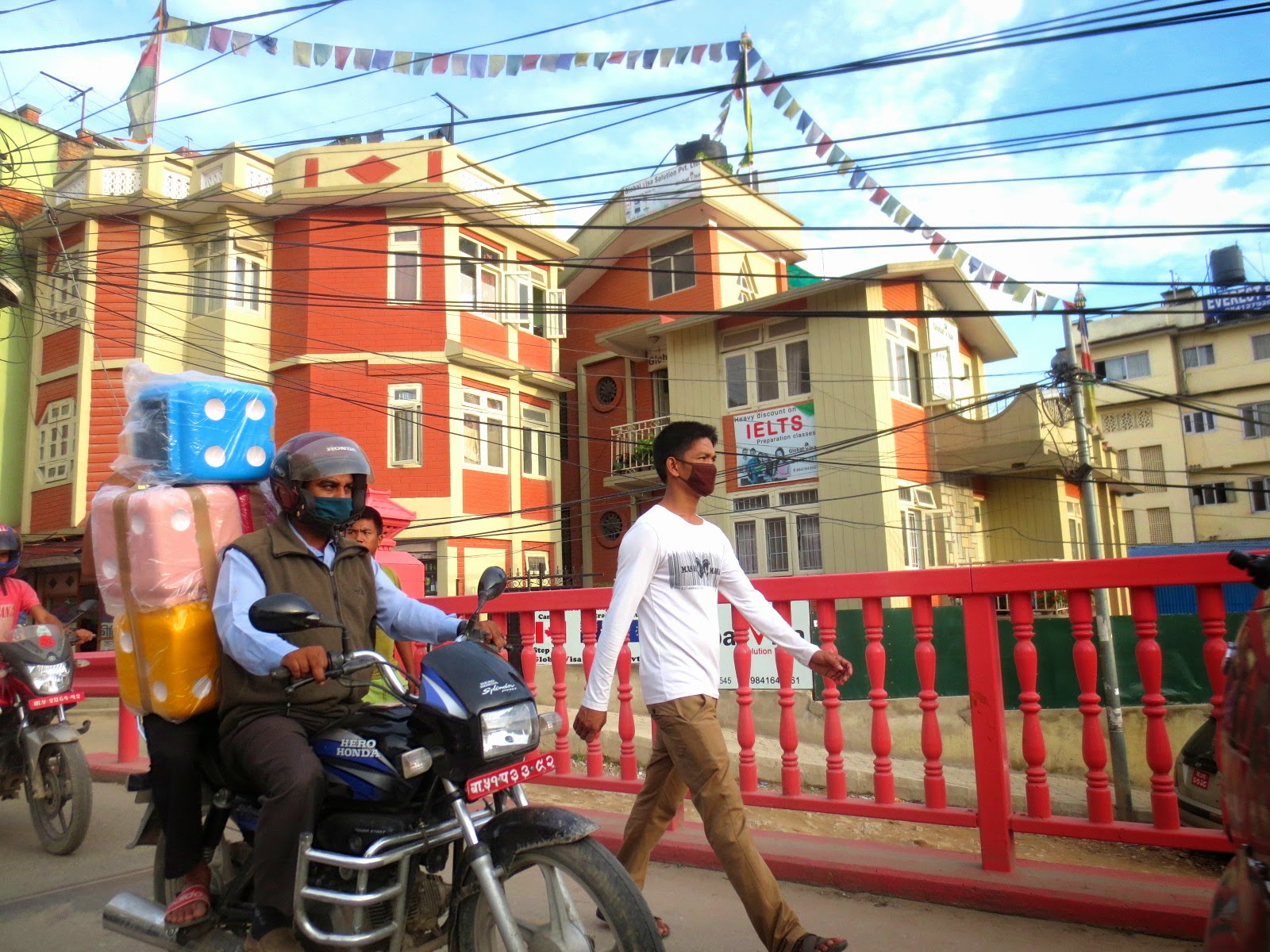(a very old draft I unexpectedly found from my old blog on Feb. 20, 2015!)
I took some photos on the way to a dinner with some Filipino-German friends the night before the World Cup Finals, and it is interesting to see a country distant from some historical event’s location the afternoon before it will happen. I’d actually seen a couple of people in front of Tribhuvan University, one of them was wearing an Argentina jersey and the other Germany, they looked like the best of chums, but sadly I didn’t have my camera on and the taxi was moving too fast. I’ve only succeeded and taking two photographs with a Germany jersey with them. One is below.
Well, every time I get my camera on a road trip, I’m always bound to capture interesting shots on the road. The scenes that catch my eye are the ones that seem to have a small story clipped onto them. I’m going to relate those stories that called me to press the click button under the pictures, or just write a little description.

Scene: A man with a Germany jersey steps out from the gate of some place I don’t know because the signs are all in Devanagari. Possibly an office?

Scene: Youngsters walk in front of an old building – the President’s house, I think.

Scene: A man behind a motorcycle driver, holding a pane of glass. They are wearing polos, which most Nepali men wear to work. The guy in the pale green one has newspapers on his hands while holding the glass, so that it won’t cut into his skin. He isn’t even wearing a helmet like the next person. They zip around at a normal speed, stopping during traffic only. This is not an unusual sight, but it is a hazard which people here don’t disallow yet.
For Filipino born-and-bred people like me, or some other country, this is queer and might even incite some laughs!

Scene: Some people by an unfinished shed by the road.
Story: Two architects in pink polos and an unseen worker:
Architect 1-‘When will this be finished?’
Architect 2-‘By next week, I guess. What do you say, dai?’
Worker-‘Possibly, if Roshan comes back quick after his daughter’s operation. We’ll need a few more materials.’
Architect 1-‘I hope it won’t rain this week too.’
Architect 2-‘Real glad Nepal is making some progress. This shed is testimony. Dai, I hope this will get finished, unlike the overpasses going to Bhaktapur.’
Worker-‘Yes! Eh, my hungry stomach’s growling now. Great day at work. My other colleagues went home already. Thanks for coming to this report.’
Architect 2-‘Hey, Abhishek, there’s a good khaja house by the next block. Dai, come with us!’
Worker-‘Oh, sorry, my wife’s cooking for us home tonight. All the best.’
I hope people here actually get these kind of conversations. Worker’s last remark isn’t typical, I guess, but in the Philippines it is, so…
Dai means ‘older brother’. Khaja means ‘tea’ or ‘snacks’.

Scene: Working-class lady and a cobbler/bag-mender guy by the road.


Scene: A door by the condominium’s elevator.
Story: “What is beyond this corridor?” Child says as he waits with them before the elevator in the almost-complete condominium. Sister fifteen years his senior, catches his query as the elevator is on floor Four.
She hasn’t yet seen the open door nor the large room inside. She does now. “It isn’t a corridor, brother.”
The other companions shuffle in impatience for the elevator. “But it is as mysterious as one.”
Floor Nine. The sister decides there is still time to explore the place. They are on Floor Thirty One. He takes her hand and they stalk into it.
There is a bamboo ladder to their front, and a support beam a little to its left. Far toward the right, there is a door with bright sunlight outlining it. The boy guesses there must be some sort of balcony outside it. Dust is on the marble floor all through out. And to the left, well, there is something quite interesting to their left. A rusty, locked door under a high window. And there is a child covered in dust sitting next to it, arms curled around knees with dusty trousers. The boy jumps, the sister, almost does too.
“H-h-hello?” the brother asks.
The child’s eyes opens. The brother doesn’t know if they are a boy or girl, the long, dusty gold hair makes it difficult.
“Oh…” The child straightens up and pats the dust out of the clothes. “I… I’m Solomon.”
The child from under the window shows his left hand to the siblings for them to shake. The children politely smiled to each other. The sister scrutinises Solomon.
“Why are you here?” he asks.
Her voice is quiet. “Eh… that…”
